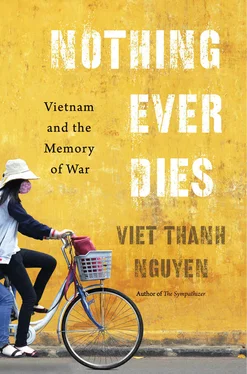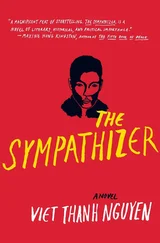So it is that Baldwin insists that war occurs not only on foreign soil, waged by soldiers against the enemy or villagers, but also on American soil, carried out by the police against blacks. Oscar Zeta Acosta makes the same charge on behalf of Chicanos when he says that “We are the Viet Cong of America. Tooner Flats is Mylai.… The Poverty Program of Johnson, the Welfare of Roosevelt, Truman, Eisenhower and Kennedy, the New Deal and the Old Deal, the New Frontier as well as Nixon’s American Revolution … these are further embellishments of the government’s pacification program.” 45To be poor and black or Chicano was to suffer from a low-intensity counterinsurgency that occasionally erupted into all-out assault, as happened to the Panthers, who the state needed to put down because the Panthers had ceased to see themselves as only being victims and began to see themselves as revolutionaries. Writer Junot Díaz agrees that war, and the interpenetration of foreign wars and domestic tragedies, is central to American life:
Where in coñazo do you think the so-called Curse of the Kennedys comes from? How about Vietnam? Why to think the greatest power in the world lost its first war to a Third World country like Vietnam? It might interest you that just as the U.S. was ramping up its involvement in Vietnam, LBJ launched an illegal invasion of the Dominican Republic (April 28, 1965). (Santo Domingo was Iraq before Iraq was Iraq). A smashing military success for the U.S., and many of the same units and intelligence teams that took part in the ‘democratization’ of Santo Domingo were immediately shipped off to Saigon. 46
In this footnote from his novel The Brief Wondrous Life of Oscar Wao , Díaz tells us that Americans have a bad habit of invading other countries. American memory may forget the invasion of his country, but that should not prevent us from seeing that the invasion of Vietnam (as some Vietnamese see it) was not an aberration. At least the Vietnam War has a name, an identity; confronted with how the invasion of the Dominican Republic has no proper name, Díaz, like all artists who look at war, engages in memorialization. He tells his readers that his Dominican characters live on American soil because war brought them here, the human blowback of American intervention. When we remember the wars that forced people to flee, oftentimes into the embrace of their colonizer or invader, then we can see that the immigrant story, staple of American culture, must actually be understood, in many cases, as a war story.
What the immigrant story supposedly registers is the difficult but ultimately rewarding struggle to become American, a transformation from wretchedness to righteousness, from victimization to voice. The mythical power of the immigrant story intoxicates. Even when the immigrant speaks explicitly of war as the origin of their Americanization, like Díaz and many others, many Americans hear them as speaking about the travails of being a new American and the horrors of the Old World. While not all war stories involve immigrants, and while war stories do not scar all immigrants, a vast territory exists where war story and immigrant story overlap. Segregating immigrant story from war story cools the seething histories of strangers who carry troubling memories of American wars, creating in their place narratives filled with damage, wound, and identity. Readers and writers often imagine damage, wound, and identity as the results of cultural conflict, being torn between two worlds, rather than what they often are, the calamitous consequences of war, colonization, and exploitation, conducted by foreign forces and domestic tyrants. The conventional immigrant story warms the heart, but the story of the immigrant as the collateral damage of American warfare warrants anger as much as tears.
The writer who is marked as ethnic or racial, who is categorized and looked down on for engaging in “identity politics,” must not simply accept or deny that pejorative. To do so is to be forced into accepting the impossible choice that a dominant society built on whiteness gives to its minorities: be a victim or have a voice, accept one’s lesser identity or strive to have no identity. To have no identity at all is the privilege of whiteness, which is the identity that pretends not to have an identity, that denies how it is tied to capitalism, to race, and to war. Inasmuch as victimization and voice are the particular and inevitable forms of alienation for minorities, so is whiteness the form of alienation for white people. Victimization and voice become the markers of difference and identity for minorities, while whiteness becomes unmarked alienation, manifest in the supposedly universal experiences of loneliness, divorce, ennui, and anomie, all of which are the cancerous costs of living in a capitalist society whose profits also accrue to whiteness. If it is true that identity politics is navel-gazing, then so is the whiteness of white people and the self-absorption of those in power. This whiteness and this power remains unchallenged by the kind of minority identity politics that does not call out the identity politics of whites or speak truth to the power of the war machine. Minorities must dissent from the terms that a regime of whiteness offers. They must call forth anger and rage, demand solidarity and revolution, critique whiteness, domination, power, and all the faces of the war machine. Southeast Asians must insist that the war that defines them in America is not only their war, but a war made by white people, a war that is not an aberration but a manifestation of a war machine that would prefer refugees to think of their stories as immigrant stories.
Even as a child, I always knew, however dimly, that the stories of my parents were not just immigrant stories but war stories. Some soldiers suffered more than my parents did, but my parents suffered more than many soldiers who served at the rear. These rear-echelon soldiers were never shot at or actually shot, threatened with a grenade, forced to flee, losing nearly everything, separated from their loved ones for decades, as happened to my parents and so many other refugees and civilians. Their stories needed to be told, but I always hesitated about telling them. “Terrible, terrible things,” my mother said, having told me some things, refusing to tell me others. “Haven’t you said enough?” my father said to her. I always wondered what was passed over in silence. I want to know and I also do not want to know, but the absent presence of the secret is enough, the secret that is theirs, not mine. Neither do I know the worlds evoked in those black-and-white photographs that arrived in the mail and sat on the mantel of my childhood home. These are the worlds where victims can be victimizers, where ghosts can be guilty, and where survivors can be inhuman. I could steal the stories of those victims, ghosts, and survivors, or make them up. But speaking for others is a simple and insufficient notion. Voice and humanity and victimization are not enough to fully comprehend what happened back then, over there. The aporia of the past always remains, the absence that I can neither know nor share, the silence that resists my speech, the ghosts who refuse resurrection. I would risk the substitute’s fate if I told only the part of the ghost’s story that humanizes its inhumanity. Ghosts are both inhuman and human and their appearance tells us that we are, too. To understand our fate and theirs, we must do more than tell ghost stories. We must also tell the war stories that made ghosts and made us ghosts, the war stories that brought us here.
WHAT IS A WAR STORY, AND WHAT makes a good one? The question concerns both the content of a war story and how it is told, the former easier to address than the latter. Both comprise what we think of as aesthetics, or the problem of beauty and its interpretation, which is rendered even more challenging when considered in relation to war. On the one hand, the artist must convey both war’s seductions, the beauty to be found in parades, uniforms, medals, explosions, and glory, all the makeup painted on the face of nationalism, which is one of the primary justifications for war in our day. On the other hand, the artist must also address the evisceration of cities, bodies, and ideals, the waste left behind in war’s wake. Art’s relationship to war is not unique, just extreme, for even the most mundane aspects of life are marked by the simultaneity of beauty and horror, where the intimacies of love and betrayal are observed at close range. To do justice to both the beauty and the horror of war is difficult at the level of both content and form, and yet necessary. It is easier to retreat to the comfort of addressing the content of war stories, and yet if one speaks of doing justice in remembering war, one might also agree that such justice is found in the form of the artwork as well.
Читать дальше












